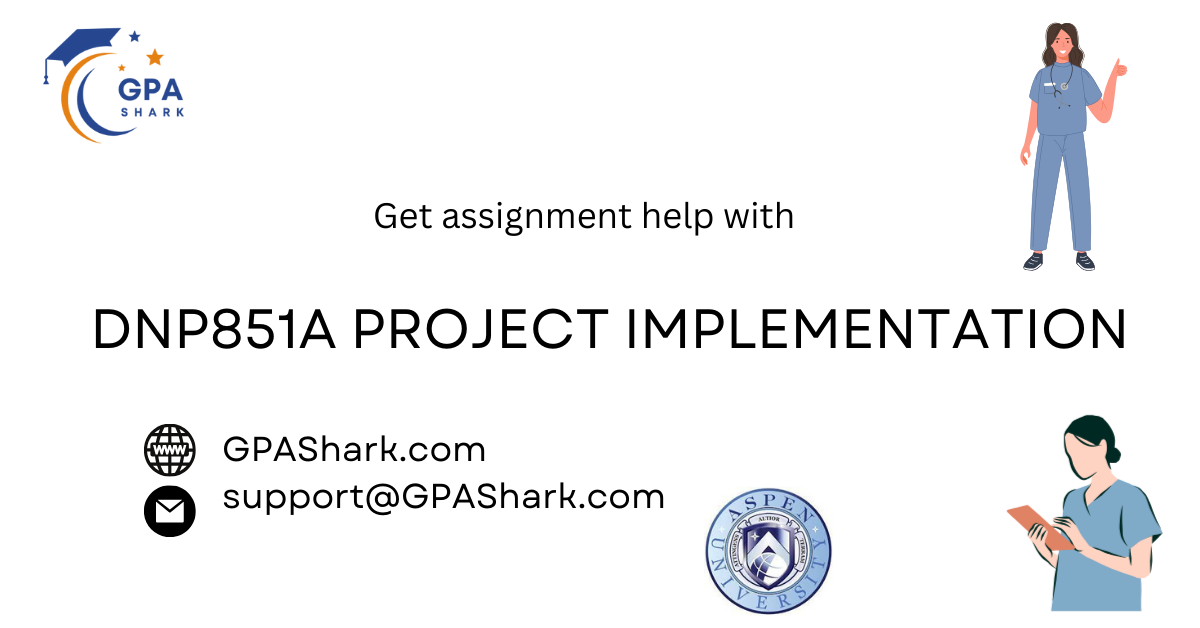Welcome to GPAShark.com, your ultimate resource for academic support and guidance. If you’re embarking on the DNP851A Project Implementation course, you’re likely progressing from DNP850B – Project Proposal. This course is pivotal in guiding you through the implementation phase of your DNP Project. Here’s what you need to know to navigate this essential part of your DNP journey successfully.
Table of Contents
DNP851A Project Implementation Course Overview
DNP851A Project Implementation is the next step after completing DNP850B – Project Proposal. This course is meticulously designed to guide DNP students through the practical aspects of their capstone project, ensuring they implement their evidence-based practice changes effectively within a healthcare setting. By the end of this course, you will have completed the implementation phase of your DNP Project, which is a significant milestone in your academic and professional career.
DNP851A Project Implementation Course Objectives
The DNP851A Project Implementation course is a pivotal phase in your Doctor of Nursing Practice (DNP) program, where theoretical planning meets practical execution. This course is designed to guide you through the process of implementing your DNP project effectively. Here’s an in-depth look at the critical components you will focus on during this course:
1. Project Implementation
Executing the Project Plan
- Action Steps: Follow the detailed steps outlined in your project proposal. Ensure each task is performed according to the planned timeline and within the defined scope.
- Resource Management: Utilize the resources allocated for your project, including personnel, equipment, and materials. Efficient management of these resources is crucial for smooth implementation.
Overcoming Challenges
- Problem-Solving: Anticipate potential challenges and have contingency plans in place. Be proactive in addressing issues as they arise.
- Adaptability: Stay flexible and ready to modify your approach based on real-world feedback and circumstances.
2. Data Collection and Analysis
Gathering Data
- Data Collection Methods: Implement the data collection methods specified in your project proposal, such as surveys, interviews, observations, or clinical measurements.
- Ethical Considerations: Ensure all data collection processes adhere to ethical standards and protect the privacy and confidentiality of participants.
Analyzing Data
- Statistical Tools: Use appropriate statistical tools and software to analyze the collected data. This analysis will help you determine the effectiveness of your interventions.
- Interpreting Results: Carefully interpret the results to draw meaningful conclusions. Look for patterns, trends, and significant changes that indicate the impact of your project.
3. Continuous Evaluation
Monitoring Progress
- Regular Check-Ins: Schedule regular check-ins with your project team and stakeholders to review progress and discuss any issues.
- Progress Reports: Create interim progress reports that summarize your activities, findings, and any modifications made to the project plan.
Making Adjustments
- Feedback Loop: Use feedback from stakeholders, mentors, and data analysis to refine your project. Make necessary adjustments to improve outcomes and address any emerging challenges.
4. Documentation
Recording Practice Hours
- Log Practice Hours: Maintain accurate and detailed logs of your practice hours. These logs should reflect the time spent on various project activities and interactions with stakeholders.
- Compliance: Ensure your documentation meets the course and program requirements, providing clear evidence of your hands-on experience.
Project Activities
- Detailed Records: Keep thorough records of all project-related activities, including meetings, interventions, data collection, and analysis.
- Reflective Notes: Write reflective notes on your experiences, challenges faced, and how you addressed them. These reflections are valuable for your professional development and final reporting.
5. Final Reporting
Comprehensive Reports
- Implementation Report: Prepare a detailed report on the implementation process, covering the steps taken, challenges encountered, and how they were addressed.
- Outcome Analysis: Include a section that analyzes the outcomes of your project, supported by data and evidence from your analysis.
Implications for Practice
- Recommendations: Based on your findings, provide recommendations for practice changes or further research. Highlight the significance of your project and its potential impact on healthcare practices.
- Future Directions: Suggest possible directions for future projects or studies that can build on your work.
DNP851A Project Implementation Assignment Help
If you are looking for assistance with your DNP851A Project Implementation assignment, GPA Shark is here to help. Our team of experienced professionals specializes in guiding students through every stage of their DNP project, from problem identification to dissemination of results. We provide comprehensive support, including literature review, project planning, IRB approval, and data analysis, ensuring that you can confidently tackle your project. Whether you need help with developing a project proposal or implementing your intervention strategy, GPA Shark offers the expertise and resources to help you succeed and achieve your academic goals.
FAQ on DNP851A Project Implementation
What are the 7 stages of DNP project implementation?
Problem Identification: Define the problem or area of interest in clinical practice.
Literature Review: Conduct an extensive review of existing literature to gather evidence and identify best practices.
Project Planning: Develop a detailed plan outlining the project’s objectives, methodology, timeline, and resources.
IRB Approval: Obtain approval from the Institutional Review Board (IRB) to ensure ethical standards are met.
Implementation: Execute the project according to the plan, including intervention strategies and data collection.
Evaluation: Assess the outcomes and impact of the project using predefined metrics and data analysis.
Dissemination: Share the results through presentations, publications, and other channels to contribute to the field.
What are the steps in DNP project implementation?
Define the Problem: Clearly articulate the clinical problem or gap in practice.
Conduct a Literature Review: Gather and analyze existing research related to the problem.
Develop a Project Plan: Create a detailed plan that includes objectives, methodology, and timeline.
Secure IRB Approval: Ensure ethical compliance and protect patient rights.
Implement the Plan: Carry out the intervention and collect data.
Evaluate Outcomes: Analyze the data to determine the effectiveness of the intervention.
Disseminate Findings: Share the results with the broader healthcare community.
What are the methods of implementation of a project?
Pilot Testing: Start with a small-scale implementation to test feasibility and make necessary adjustments.
Phased Rollout: Implement the project in stages to manage resources and mitigate risks.
Full Implementation: Execute the project across the entire intended setting once readiness is confirmed.
Continuous Monitoring: Regularly track progress and make adjustments as needed to ensure success.
How do you create a DNP851A Project Implementation project?
Identify a Clinical Problem: Select a relevant and impactful problem in your clinical practice.
Review Existing Literature: Gather evidence and best practices related to the problem.
Develop a Proposal: Write a comprehensive proposal outlining the problem, objectives, methodology, and expected outcomes.
Seek IRB Approval: Submit your proposal to the Institutional Review Board for ethical review and approval.
Plan the Implementation: Create a detailed plan that includes resources, timeline, and intervention strategies.
Execute the Plan: Implement the project, collect data, and make necessary adjustments.
Evaluate and Disseminate: Analyze the results, evaluate the effectiveness, and share your findings with the healthcare community.
Also Read:
- Aspen University DNP Capstone Project Help
- DNP800 Theoretical and Scientific Underpinnings
- DNP805 Organizational and Systems Leadership
- DNP835 Strategic Leadership and Business Management
- DNP840 Strategic Planning and Financial Management
- DNP825 Health Information Management and Informatics
- DNP810 Evidence-based Practice for Quality Improvement
- DNP820 Health Policy and Advocacy
- DNP830 Global Population Health
- DNP850A Project Planning
- DNP850B Project Proposal
- DNP851A Project Implementation
- DNP851B Project Data Analysis
- DNP852A Project Manuscript
- DNP852B Project Dissemination

